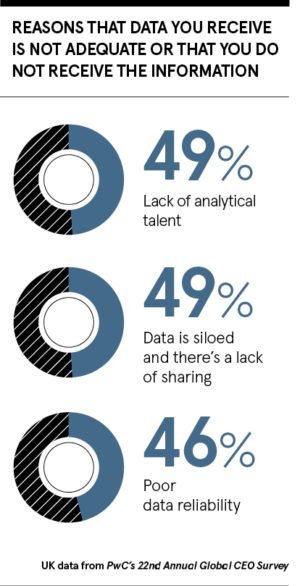Does your business want to improve its decision-making? Clean data is the driving force says BackOffice Associates.
An article in The Times’ supplement, Raconteur, emphasises that it’s becoming increasingly crucial for enterprises to have a full understanding of data quality, and such requisites ensure decision making is free from bias and helps to drive innovation in the digital economy.
As experts in data quality this resonates with us because data cleansing helps large firms to extract more value from their equally large databases, thus enabling them to become more efficient and maximise on ROI. According to chief strategy and technology officer, Rex Ahlstrom, “When you ask people if their data quality is good, they’ll almost certainly say no”. Undoubtedly this is a worrying notion, one that can occur for a number of reasons.

Source: PricewaterhouseCoopers
Here are two data-related problems that large businesses face.
1. Siloed Data
PricewaterhouseCoopers’ 22nd Annual Global CEO Survey reveals 49% of respondents say that data is siloed and there’s a lack of sharing.
Siloed data can impact on data integrity because, for example, if an organisation has two or more in-house silos for the same data, their contents can differ. This results in duplicated records and creates confusion as to which data set represents the most up-to-date information. Ultimately, not having a structured, consolidated database makes it virtually impossible to achieve a single view.
Due to the complexity of the relationships your business has with its customer base, achieving a single customer view is imperative, regardless of the industry you are in. It’s common for customers to face multiple touch points when dealing with an organisation, which leads to companies holding multiple records about them. In order to maintain a positive relationship with your customer base, you need to identify the location of your duplicate records.

Merging your data into a centrally controlled master file will help you to highlight duplicate entries. You may find that you hold information containing some of your customers’ previous addresses as well as their current one. Not to mention that some customers may have the same name. John Smith of 5 Acacia Avenue may be the same John Smith who used to live at 13 Warwick Road, but he could also be a different John Smith entirely. Therefore, it’s vital that you flag these entries and double check you aren’t deleting the wrong records when deduping your data.
A single view makes customer relationship management much easier. For large organisations, this will increase efficiency through the ability to access a single reference point for each individual customer, thus reducing wasted time spent clarifying the correct entry across disparate data sets.
2. Inaccurate Data
Did you know 46% of CEOs put inadequacy down to poor data reliability?
Having unreliable data in your database can be just as bad as having siloed data. As humans we follow a linear passage of time. There’s a beginning and an end with a series of events in between. On a daily basis 9,590 households move, 1,496 people get married, and 1,500 people die. Each of these events affect the reliability of your data.
Cleansing your data regularly will help your business highlight any discrepancies, such as movers and deceased persons. Checking your data against multiple suppression files will flag these entries as well as marketing preference service matches. Using numerous suppression files will enable you to validate your data across multiple trusted sources.
The benefits of data cleansing are endless. Ensuring your customers’ addresses are up to date as well as removing deceased persons from your mailing list will help increase customer satisfaction as well as savouring your brand image. Compliance with data legislation, such as the GDPR, is also a major benefit. Frank Schuler from BackOffice Associates adds:
“Knowing the underlying data is good quality keeps companies out of court and reduces compliance failures, as well as optimising processes, reducing costs, and driving innovation.”

When it comes to the ability of businesses to cleanse their data, Rex Ahlstrom expresses that few companies know all the potential locations where their data resides due to the abundance of applications. Club this with another finding from PwC’s survey that 49% of respondents lack analytical talent. This is where outsourcing data cleansing software comes in handy.
3. The Solution
Hopewiser provide a number of data cleansing solutions to ensure the addresses in your database are of the highest possible accuracy. Our Bureau service is a bespoke solution to help improve and enhance your data to get maximum mailing discounts on your own database without the expense of new software and staff training. In addition, this service gives access to address validation and suppression files to reduce wastage on your marketing spend with no more goneaways, duplicates, and deceased records.
Our installed Atlas software combines Hopewiser’s many years of experience with advanced tools to deliver fast, user friendly solutions which will help to cleanse your database to achieve maximum ROI. The Atlas data cleansing suite contains several different components, each with unique functionalities that serve as an easily integrated solution alongside your existing applications, or as a stand-alone product.
Data Cleansing is also available in the form of a quick and easy online solution, which gives you immediate access to the latest in-built PAF and suppression files. It’s simple to use, meaning you can be up and running within minutes, and it also includes a fast, user-friendly wizard with helpful tips to guide you through the process. A free sample data audit will highlight how many suppressions your records have. Prices then start from as little as £35.
, updated 31st July 2019.
Topic: ComplianceData CleansingGDPR

